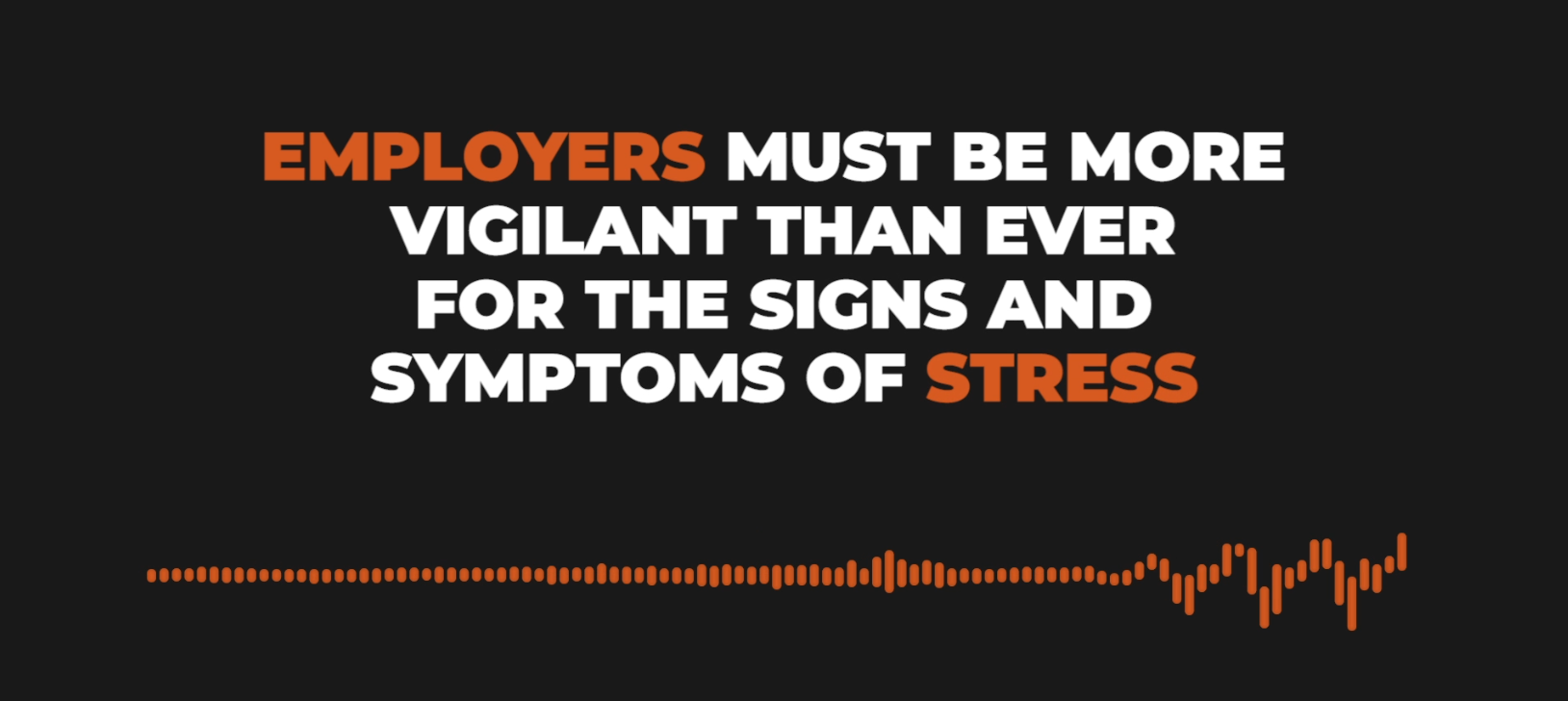
This episode of Workplace Matters looks at what employers can do to better their employee’s mental health amid the COVID-19 pandemic. Stress has always been present in the workplace, but for many this time is especially stressful. How can employers ease that stress for their employees?
We talked with Dr. Saba Ali, Professor of Counseling Psychology in the College of Education at the University of Iowa about what employers can do.
Host: Michael Guhin
Guest: Dr. Saba Ali
Michael: You’re listening to workplace matters. Mental health and the workplace has previously been an important issue for employers to focus on. But now during COVID-19, employee mental health is becoming more important than ever. We talked with Dr. Saba Ali, professor of counseling psychology in the College of Education at the University of Iowa, about what employers should know about their employees’ mental health right now and what can be done to help improve it.
Michael: Each workplace is different and carries its own set of stress factors. Factors which may become more prevalent during COVID, along with a new set of challenges, especially for essential workers and small businesses.
 Dr. Ali: A Small business needs to make money, to have business, to make sure that their branding is out there just in normal times. But obviously with COVID-19, they can’t do the usual kinds of activities or services that they usually provide, and that’s a huge financial stress. It’s a huge stress on small businesses. It’s a huge stress on workers worried about paychecks, worried about how they’re going to feed their families, worried about if they can get back to business and when they can get back to business. Certainly, that’s a huge part of stress right now. I think that most Americans are living under. Most people in the world right now are living under, but it’s exacerbated for anybody who owns a small business right now, that’s in the service industry.
Dr. Ali: A Small business needs to make money, to have business, to make sure that their branding is out there just in normal times. But obviously with COVID-19, they can’t do the usual kinds of activities or services that they usually provide, and that’s a huge financial stress. It’s a huge stress on small businesses. It’s a huge stress on workers worried about paychecks, worried about how they’re going to feed their families, worried about if they can get back to business and when they can get back to business. Certainly, that’s a huge part of stress right now. I think that most Americans are living under. Most people in the world right now are living under, but it’s exacerbated for anybody who owns a small business right now, that’s in the service industry.
Michael: Employers must be more vigilant than ever for the signs and symptoms of stress so that if an employee is feeling overly stressed, they can get help as soon as they need to. So what are the signs and symptoms? What should employers look for?
Dr. Ali: We can look at some of the symptoms of generalized anxiety disorder and see some of the stressors. You know, increased irritability, increased worry, loss of appetite, an inability to concentrate on tasks. Those are usually really good signs that somebody is experiencing stress. Sometimes, you know, people are more verbal, you know, different people, different personality. Some people express their frustration and their stress more openly. Others, you would have to look for some of these signs. I think one of the biggest signs of stress right now would be at really a decreased ability to concentrate and heightened levels of sort of physiological arousal. So, you know, feeling jittery, feeling nervous. Those kinds of things that you might be able to actually see in a person rather than maybe hear it. And again, some people are much more verbal about their feelings of stress or the feelings of fear and others.
Michael: Each workplace should have an individualized approach for their specific employees. But are there best practices that can be applied to all businesses? Dr. Lee identified three practices which can be implemented into workplaces to alleviate stress.
Dr. Ali: It really depends on what type of workplace you’re in right now. I mean, obviously, some people are much more frontline than others in this whole pandemic. But I would say that there’s three things across the board that I would really encourage supervisors to think about with their employees. The first one would be to the extent that you can decrease mental load or cognitive load in your employees, it would be a really helpful thing. So thinking about it from the perspective of trying to help workers do the tasks that are essential right now versus trying to, you know, increase productivity or think about how how people need to get things done is really by reducing the load and letting people concentrate on the tasks that are most important, really, really will help people in the workplace to kind of focus their energies and decrease stress of thinking about a lot of different things at the same time. So that would be, I think, the number one thing. I think one of the other things is information is really helpful for workers in this time. So I think transparency, but balancing that with hopefulness.
Dr. Ali: So transparency about what’s going on, maybe financially for a company or what’s going on in terms of for health care workers, what’s going on with the protective gear that they need. Being transparent about that, but also being hopeful that things can get better, that they will get better. But being practical about that information, not lying to people. Being very careful about how you give people the information, but also making sure that you’re transparent and let people know what really is going on. I think the third thing is this thinking about if you’ve ever heard of Maslow’s hierarchy of needs, it’s like a pyramid.
Michael: Maslow’s hierarchy of needs is a psychological theory which proposes that in order for people to be motivated and healthy, they need to have five intrinsic human needs satisfied physiological needs, safety, love or belonging, esteem, and finally self-actualization.
Dr. Ali: So I think right now what we need to do is concentrate on that bottom of the pyramid, make sure people’s physiological needs are met, make sure they have food, shelter, those kinds of things. You also want to create a sense of belonging or a sense of collectivism around this whole pandemic and how we’re dealing with it. When people feel those kinds of two things, they feel safer if their needs are met at the very basic level. They just tend to feel safer. And that reduces some of the stress. And stress really interferes with concentration, if you can help people deal with that kind of stress and anxiety that they’re experiencing, then you can’t get them to maybe concentrate and focus a little bit more on the job at hand and again, depending on what kind of work you’re doing. If you’re an essential worker right now, you need all the energy you can to do the job. So if you can help people concentrate a little bit better by helping them get mental health resources that they need, then, people are safer in general because the people who are doing the essential work right now are more focused on their job and not worrying about everything else. So I think mental health has to be a priority to help people to reduce stress so that we’re all just safer.
Michael: Moving forward, keeping the mental health home employees in mind during the COVID-19 pandemic should be a priority to maintain productivity and to continue to have our essential workers healthy. And this doesn’t need to be a fight that employers need to go through alone.
Dr. Ali: They’re doing telehealth right now or tele therapy, which I think is really helpful. So certainly mental health agencies, but they’re also things like apps that do calming breathing techniques, relaxation techniques that I think can be really helpful. There’s a lot of information online right now through the American Psychological Association, through the American Counseling Association that can help with really sort of basic information about what employers can do for their employees at this time and ways that they can introduce stress reduction in the workplace. But I do recommend sort of being the idea of apps or anything that sort of helps to focus people on what they need. I think also mental health breaks during the day are really important, like letting people have that time, you know, 10 minutes to just walk around outside or whatever it is that they need to do to just again reduce that anxiety and stress so they can come back in and concentrate on what they need to do.
Michael: Workplace Matters is supported by the National Institute for Occupational Safety and Health. Visit Healthier Workforce Center .org to listen to more podcasts and view our ongoing video series. And from all of us at the Healthier Workforce Center, stay safe and healthy.
The Workplace Matters podcasts are located here.
COVID-19 Employer Resources are available here.
